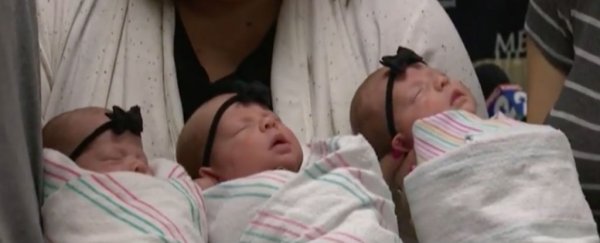You might have seen the news that identical triplets were born this week in Houston. The chances of this occurring are incredibly remote, and research has shown that it ultimately comes down to the chances of an egg splitting not once, but twice, during pregnancy.
The official term for identical twins (or triplets) is monozygotic multiples, where an egg is fertilised and then splits up, leaving two embryos with the same DNA. Scientists don't yet understand why this happens, but in the case of twins, it's said to occur three times in every 1,000 deliveries across the world, and it's a much less common occurrence than non-identical twins being born.
The original egg has to split three ways to create identical triplets - and that's why it's so rare.
As for just how uncommon it is, no one seems to be able to decide on a number. Reuters thinks around 200 million to one are the odds, About.com says between 60,000 and 200 million to one (quite a range), but most reports seem to just stick with "one in a million". Most experts agree that the statistics are difficult to calculate, and you'll hear different figures depending on your chosen source.
What are called dizygotic multiples are much more common, and result in fraternal rather than identical triplets: in this case three (or two or four) separate eggs are fertilised and turn into embryos, each containing their own DNA and own unique individual. While twin and triplet rates have increased in some countries due to fertility treatments and women leaving childbearing till later in life, these are fraternal (dizygotic) rather than identical (monozygotic) twins and triplets.
Contrary to what you might have heard, identical twins and triplets are nothing to do with your genes, as The Washington Post explains. Genetic family traits where more eggs are released during ovulation cycles might influence the likelihood of twins or triplets, but these would be fraternal multiples rather than identical multiples.
Identical twins (or triplets or quadruplets) are pure biological luck, at least based on the science we know today.
Not that all of this number-crunching will bother Stephanie and Brad Harris or their three new arrivals, who were allowed to leave hospital in the new year after a month in neonatal intensive care. "I was shocked and still trying to get over learning we were having twins when we got news of triplets," Harris told NBC News. "Hopefully they don't get mixed up."
